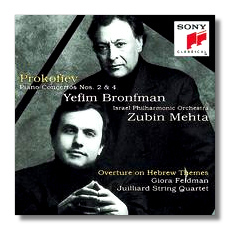
The Internet's Premier Classical Music Source
Related Links
- Prokofieff Reviews
- Latest Reviews
- More Reviews
-
By Composer
-
Collections
DVD & Blu-ray
Books
Concert Reviews
Articles/Interviews
Software
Audio
Search Amazon
Recommended Links
Site News
 CD Review
CD Review
Serge Prokofieff

Piano Concertos #2 & 4
- Concerto for Piano #2 in G minor, Op. 16 (1913)
- Concerto for Piano #4 in B Flat Major, Op. 53 (1931)
- Overture on Hebrew Themes Op. 34 (1919) *
Yefim Bronfman, piano
* Gloria Feldman, clarinet
* Juilliard String Quartet
Israel Philharmonic Orchestra/Zubin Mehta
Sony SK58966 65min
The first installment in Bronfman's Prokofieff concerto cycle crossed my path just over one year ago. I dismissed it as "stiff, relentlessly driven, and joyless". This time around I'm tempted to add yet another adjective: superficial.
Although he liked to think of himself as a revolutionary enfant terrible, Prokofieff was a romantic at heart, which probably explains why we still enjoy his work so much today. He even grudgingly admired the Second Concerto of that arch-reactionary, Sergei Rachmaninoff. The spirit of that score is never very far beneath the surface in the opening movement of Prokofieff's own Second Concerto, beginning as it does with a lush melody that Rachmaninoff himself might have penned. For whatever reason, Bronfman seems intent on draining all emotion and expression from this music. Perhaps he sees a parallel between this concerto and the more objective, avant-garde works that Prokofieff produced later while living in Paris. Whatever the reason, Bronfman's approach simply doesn't work, especially when compared the white hot passion of Ashkenazy/Previn on London. Bronfman tosses off Prokofieff's flashy piano writing with ease and seeming indifference, while Ashkenazy's slower pacing (particularly in I and IV) enables him bring out all the aching beauty inherent in the score. The steely brilliance of Ashkenazy's playing, not to mention the unique way he highlights every phrase with delicious little accents, dynamic shadings, or balances among the voices makes every moment special – even those transitional passages that seem so weak in Bronfman's hands. The evil demons that plague III are effectively neutralized by Bronfman's glib indifference and Mehta's lackluster accompaniment. By contrast, Previn's brass snarls ominously, his winds scamper like devilish pranksters, and Ashkenazy plays as if possessed. Kun Woo Paik (Naxos) is very nearly Ashkenazy's equal in this work, and his outstanding versions of all five Prokofieff piano concertos may be had for less than the cost of this single new disc. The London and Naxos recordings both have more presence, better balances, and a much warmer piano than Sony's brittle sounding instrument. Bronfman's impersonal and anti-romantic approach works best in Concerto 4, and his performance is generally lively and often quite exciting. In III Bronfman and Mehta even appear to be having a bit of fun! Nonetheless Paik, Ashkenazy, and especially Krainev (Teldec) are all plumb greater depths in this quirky, yet powerful work.
The real highlight of this disc is the Overture, as heard in its original scoring for clarinet, string quartet, and piano. Giora Feidman emphasizes the Hebrew character of the melodic material by playing with the dark, plaintive sound and thick vibrato of the great Klezmer clarinetists. The Juilliard Quartet's Joel Krosnick even follows Feidman's lead and does an excellent imitation of the Klezmer clarinet style with his cello. The performance is slow, stately, and deeply affecting. If only the two concertos had been half as good, this disc would have been an easy recommendation.
Copyright © 1996, Thomas Godell




















